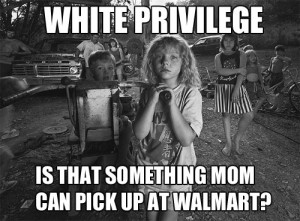

Yet, with growing acceptance of the concept, there has also been resistance. And it captures the experience of structural racism many inhabitants of France’s social-housing neighbourhoods have shared.

The concept is particularly accurate to describe the legacies of slavery and colonial politics. In France, use of the term white privilege is relatively recent, introduced in the late 2000s by social scientists. Calls to transform racialised organisations are viewed as threats by white people who, correctly, hear demands for racial justice as an end to white privilege. Despite the political dismantling of apartheid, white privilege persists.
#White privilege explained in one simple comic skin#
In South Africa, white privilege is the legacy of apartheid, which subjugated and devalued anyone whose skin colour was not white. While scholars in some other countries have recently used the term to elucidate systemic patterns of inequality in their own societies, in other countries scholars have been more dubious about the concept. The N-Word: a volcano kept active by the flickering embers of racism For whites in the US, where many live in racially homogeneous communities, the concept of white privilege could spark individual self-reflection and motivate individual political action. They were seeking to call attention to the myriad ways in which whites, regardless of their class, benefit from white supremacy and are, therefore, implicated in maintaining the system. Unpacking how whiteness operates to bestow privilege may allow us to understand how ‘others’ are systematically denied those same rights.īy the mid-2000s, the term white privilege had been adopted by many educators and activists in the US. Unlike terms such as “racial injustice” and “systemic racial bias”, the idea of privilege centres the discussion around individuals.įocusing the discussion on the individual is especially effective for the purposes of anti-racist teaching and advocacy. The term white privilege originated in the US in the 1980s, referring to both the obvious and the hidden advantages afforded to white people by systemic forms of racial injustice. However, it does not always translate well to these new contexts. They say that the term ‘white privilege’ reinforces stereotypes, reifies conceptualisations of race, antagonises potential allies and creates even greater resistance to change.Īs movements for racial justice have become more global in scope, the term has circulated across national boundaries. Stellenbosch University provides funding as a partner of The Conversation AFRICA.įrom France to Columbia and South Africa, demonstrators used the term ‘white privilege’ as a means of challenging people to confront the racial disparities evident in their own countries.Īmid the demonstrations, a group of international scholars brought together at the Center for Advanced Study in the Behavioral Sciences at Stanford University in 2020 began discussing whether the concept of ‘white privilege’ is useful for addressing systemic racial inequalities across national contexts.Īlthough it is clear that the term has become popular across diverse contexts, some have argued against it. University of Virginia and University of California, Los Angeles provide funding as members of The Conversation US. Région Nouvelle-Aquitaine provides funding as a strategic partner of The Conversation FR.

Karolyn Tyson, Kevin Driscoll, Nuraan Davids, and Veronica Terriquez do not work for, consult, own shares in or receive funding from any company or organisation that would benefit from this article, and have disclosed no relevant affiliations beyond their academic appointment. Vivian Zayas receives funding from National Science Foundation. Magali Della Sudda receives funding from Agence nationale de la recherche GILETSJAUNES 2020-2024. Professor of Psychology, Cornell University Professor, University of North Carolina at Chapel HillĪssistant Professor of Media Studies, University of VirginiaĪssociate professor, UCLA Luskin School of Public Affairs Professor of Philosophy of Education, Stellenbosch University


 0 kommentar(er)
0 kommentar(er)
